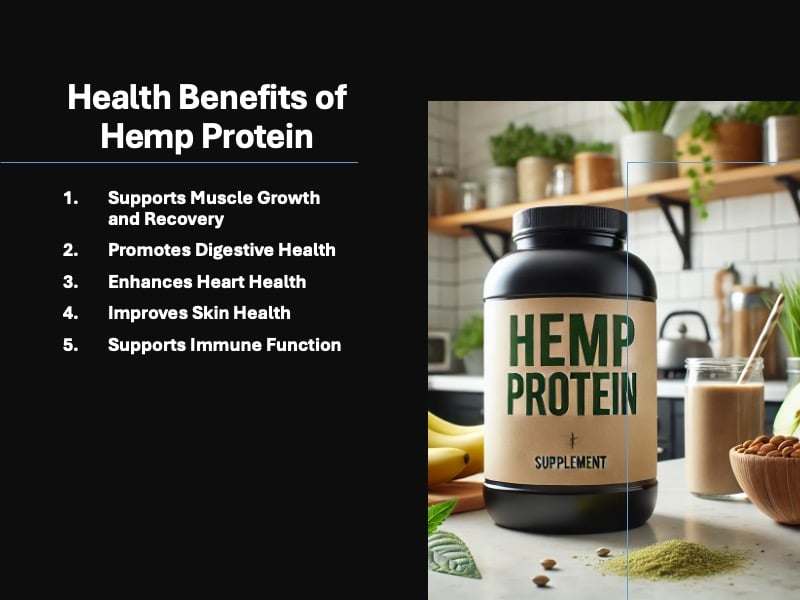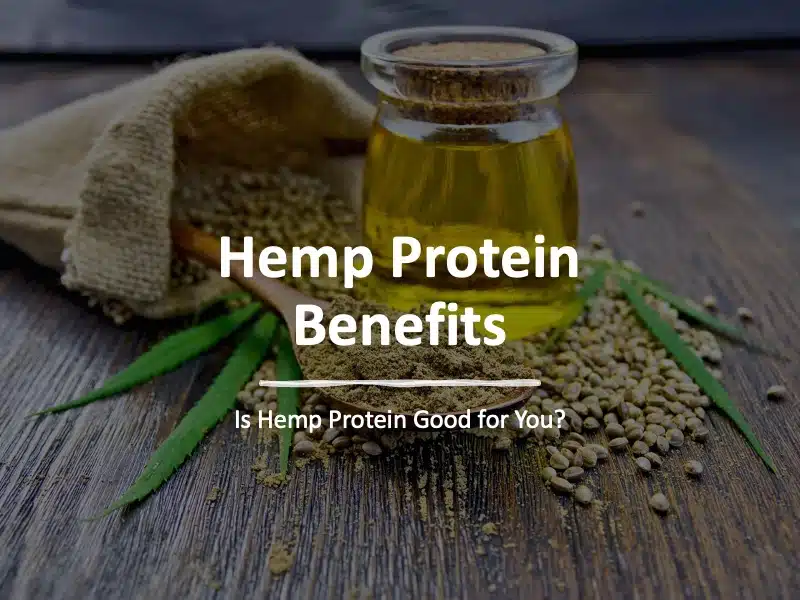Hemp Protein Benefits: Is Hemp Protein Good for You?
Hemp protein has gained recognition in the health and fitness community as an excellent plant-based protein source. Packed with essential nutrients, it offers a sustainable option for those seeking alternatives to animal-derived proteins.
Understanding the benefits, nutritional properties, and appropriate intake of hemp protein can help you determine whether it fits your health goals.
Hemp protein is one of my favorite plant-based protein sources because it contains all nine essential amino acids (EAAs), making it a complete amino acid source. This is rare for a plant protein, and it’s a big reason why I recommend it.
As a professional athlete with a background in nutrition education, I’m always looking for sustainable, nutrient-dense options that support performance and overall health.
Hemp protein is packed with essential nutrients like omega-3 fatty acids, fiber, and minerals, making it an excellent alternative to animal-based proteins.
Not only does hemp protein offer a full amino acid profile, but it’s also easily digestible, making it ideal for anyone looking to build muscle, recover from exercise faster, or improve overall wellness.
Its combination of protein, healthy fats, and fiber provides lasting energy while supporting digestion and heart health.
For those looking to improve their nutrition with a plant-based, eco-friendly option, hemp protein is a great choice!
Last update on 2025-04-15 / This article includes affiliate links/Images via Amazon Product Advertising API. I may earn commissions on purchases made through these links.
What Is Hemp Protein?
Hemp protein is derived from the seeds of the hemp plant (Cannabis sativa), a strain cultivated for industrial use that contains zero or negligible amounts of THC, the psychoactive compound found in marijuana.
This makes it a safe and legal source of nutrition, especially popular among vegans, vegetarians, and those with dairy or soy sensitivities.
Nutritional Properties of Hemp Protein
Hemp protein is a complete protein, meaning it contains all nine essential amino acids necessary for muscle repair and overall body function. It also provides an array of other important nutrients:
- Protein: Approximately 15-20 grams of protein per 30-gram serving, making it comparable to other plant-based proteins like pea or rice protein.
- Fiber: Hemp protein is rich in fiber, which aids digestion and supports gut health.
- Omega-3 and Omega-6 Fatty Acids: Hemp protein contains healthy fats, including omega-3 and omega-6 in an optimal 3:1 ratio, which can promote heart health and reduce inflammation.
- Minerals: It is an excellent source of magnesium, iron, and zinc, which support muscle function, energy production, and immune health.
- Antioxidants: Hemp protein contains various antioxidants like lignanamides, which help protect the body against oxidative stress and cell damage.
Health Benefits of Hemp Protein

- Supports Muscle Growth and Recovery: As a complete protein, hemp protein provides all essential amino acids required for muscle repair and growth. For athletes, bodybuilders, or anyone engaging in regular exercise, hemp protein can help optimize post-workout recovery, making hemp protein one of the best foods for muscle building.
- Promotes Digestive Health: The high fiber content in hemp protein—up to 8 grams per serving—can improve digestion, promote bowel regularity, and support the gut microbiome. The combination of soluble and insoluble fiber aids in slowing down digestion, which can help regulate blood sugar levels and keep you feeling fuller for longer.
- Enhances Heart Health: The presence of omega-3 and omega-6 fatty acids in hemp protein may lower cholesterol levels and improve cardiovascular health. The ideal balance of these fats in hemp protein is crucial in reducing the risk of heart disease by controlling inflammation and supporting artery health.
- Improves Skin Health: The omega-3 fatty acids and other micronutrients in hemp protein can promote healthy skin by reducing inflammation and maintaining the skin’s moisture barrier. People with skin conditions like eczema or psoriasis may benefit from including hemp protein in their diet.
- Supports Immune Function: Hemp protein contains essential fatty acids, magnesium, and zinc, which play a crucial role in maintaining a healthy immune system. The high antioxidant content also protects the body from oxidative damage, further boosting overall immune response.
How Much Hemp Protein Should You Consume?
The amount of hemp protein to consume varies depending on individual goals and nutritional needs. However, the general recommendation for protein intake to build muscle is around 0.8 grams per kilogram of body weight for most adults, while athletes and individuals focused on muscle growth might aim for 1.2-2.0 grams per kilogram.
For those using hemp protein as a supplement, a typical serving is 1-2 scoops (about 30-40 grams) post-workout or as part of a balanced meal.
It’s always best to consult a nutritionist to determine the appropriate amount based on your activity level and health goals.
Is Hemp Protein Safe?
Hemp protein is generally considered safe for most people. Since it contains negligible amounts of THC, there’s no risk of psychoactive effects. It’s an excellent option for those who cannot consume dairy-based proteins like whey or casein, or soy-based proteins due to allergies or sensitivities.
However, those with autoimmune conditions or allergies to hemp should consult a healthcare provider before adding hemp protein to their diet.
How to Add Hemp Protein to Your Diet
Hemp protein is versatile and can be easily incorporated into various meals and snacks (Cerino et al., 2021).:
- Smoothies and shakes: For a protein boost, add a scoop of your favorite hemp protein powder supplement or some hemp seeds to your favorite post-workout smoothie.
- Baked goods: You can mix hemp protein powder into muffins, cookies, or pancakes for added nutritional value.
- Oatmeal or cereal: Stir hemp protein powder into your morning oatmeal or cereal for a filling, protein-rich breakfast.
- Homemade protein bars: Combine hemp protein with nuts, seeds, and dates to make your own protein-packed bars.
Hemp Protein Powder vs. Hemp Seeds: Which Is Better?
Hemp protein powder and hemp seeds both offer impressive nutritional benefits, but they differ in their protein, fat, and fiber content, making them suitable for different health goals.
Nutritional Differences
- Hemp Protein Powder: Provides around 15-20 grams of protein per serving, with reduced fat and high fiber, making it ideal for muscle building and digestion support.
- Hemp Seeds: Contain about 10 grams of protein and 14 grams of healthy fats (omega-3 and omega-6) per serving, offering a more balanced nutrient profile, including heart-healthy fats.
Benefits
- Hemp Protein Powder: Best for boosting protein intake, improving digestion due to its high fiber content, and supporting muscle recovery.
- Hemp Seeds: Excellent for overall nutrition, providing a good balance of protein, healthy fats, and fiber, while also promoting heart and skin health.
Usage
- Hemp Protein Powder: Commonly used in smoothies, shakes, or baked goods for added protein.
- Hemp Seeds: More versatile, easily sprinkled on salads, yogurt, or oatmeal for a nutrient boost.
Which Should You Choose?
- Choose hemp protein powder for concentrated protein and fiber, especially if you’re focused on muscle building or digestive health.
- Choose hemp seeds for a whole-food option rich in healthy fats and balanced nutrition.
Both are sustainable, allergen-friendly, and digestible, so the best choice depends on your specific dietary needs.
Best Hemp Protein Supplement
In my opinion, Just Hemp Foods Hemp Protein Powder Plus Fiber is one of the best hemp protein supplements available.
It’s affordable and highly effective, offering a potent combination of 11 grams of protein and 11 grams of fiber per serving.
This supplement is non-GMO verified and contains no artificial additives, making it a great natural option for boosting your daily protein intake. It’s also rich in omega-3 and omega-6 fatty acids, which promote heart health, and its high fiber content supports digestion and gut health.
The powder’s versatility allows it to be easily added to smoothies, oatmeal, or baked goods, offering a convenient way to enhance your nutrition.
Last update on 2025-04-15 / This article includes affiliate links/Images via Amazon Product Advertising API. I may earn commissions on purchases made through these links.
Final Thoughts: Is Hemp Protein Good for You?
Hemp protein is a highly nutritious, plant-based protein source that offers several health benefits, from supporting muscle growth to improving heart and skin health.
It’s an excellent choice for individuals looking for a complete, easily digestible protein free from dairy or soy, while also benefiting from its omega-3 fatty acids, fiber, and antioxidants.
Whether you’re an athlete or simply trying to maintain a healthy lifestyle, hemp protein can be a valuable addition to your diet.
FAQs About Hemp Protein
1. What are the benefits of hemp protein?
Hemp protein provides essential amino acids, making it a complete protein that supports muscle growth and recovery. It’s also rich in fiber, which aids digestion, and contains healthy omega-3 and omega-6 fatty acids that promote heart health. Additionally, hemp protein is packed with minerals like magnesium, iron, and zinc to boost overall well-being.
2. Can hemp protein make you high?
No, hemp protein cannot make you high. It’s made from hemp seeds, which contain only trace amounts of THC, the psychoactive compound found in marijuana. The amount of THC in hemp protein is negligible and safe for consumption.
3. How should I use hemp protein?
Hemp protein is versatile and can be used in smoothies, protein shakes, oatmeal, or baked goods. It can also be sprinkled on salads or mixed into yogurt. Its slightly nutty flavor complements a variety of dishes.
4. Is hemp protein safe for people with allergies?
Hemp protein is a good option for those with dairy, soy, or gluten allergies, as it’s free from common allergens. However, if you have an allergy to hemp itself, consult a healthcare provider before use.




